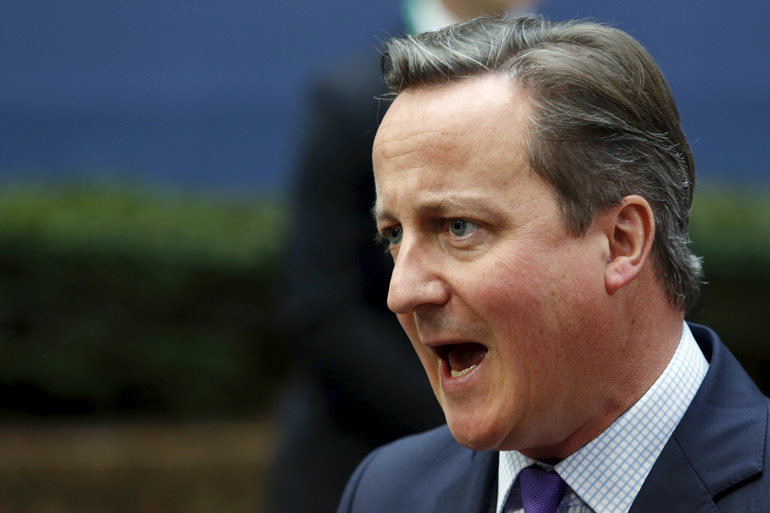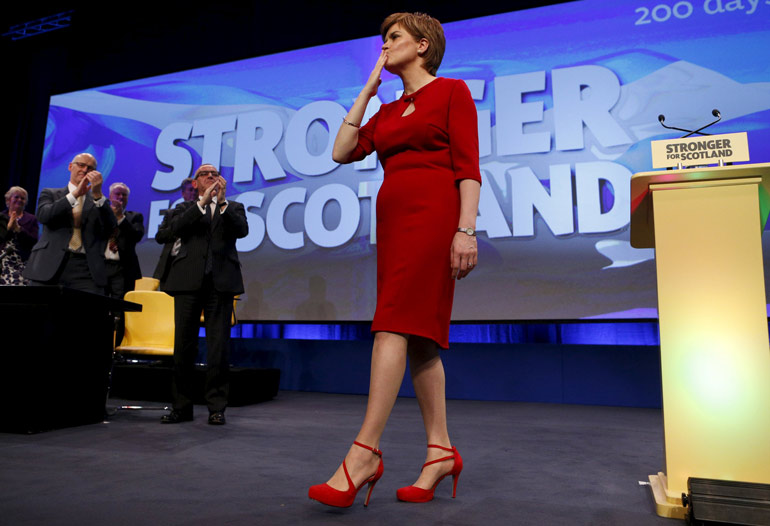Monday Feb 23, 2026
Monday Feb 23, 2026
Monday, 19 October 2015 00:00 - - {{hitsCtrl.values.hits}}

Britain's Prime Minister David Cameron
LONDON (Reuters): Trade and investment between China and Britain can benefit further from a ‘golden era’ in their bilateral relations, British Prime Minister David Cameron said ahead of a state visit to London by Chinese President Xi Jinping.
Cameron was echoing remarks by China’s ambassador to Britain, Liu Xiaoming, who said Xi’s visit on 19-23 October would mark the dawn of a ‘golden time’ in bilateral ties.
“It’s going to be a very important moment for British-Chinese relations, which are in a very good state, something of a golden era in our relationship,” Cameron told China Central Television.
“The change we will see is obviously the investment into our infrastructure, Chinese companies employing people and creating jobs. But I think it’s also a big win for China as well, having access to a country that is a leading member of the EU and has so many other contacts and roles in the world.” Cameron’s Conservative government is seeking to renegotiate the terms of Britain’s EU membership and will call a referendum by the end of 2017 on whether to stay or leave the bloc.
Diplomats say Beijing is concerned about the implications of Britain, a strong advocate of free trade, exiting the EU and about any weakening of a bloc it views as a vital global counterbalance to the United States.
Despite such concerns, Xi’s visit will take place in a cordial atmosphere and include a state banquet hosted by Queen Elizabeth at Buckingham Palace.
The British government has moved forcefully to strengthen financial ties with Beijing. Earlier this year, it broke ranks with the United States, its close ally, by signing up as a founding member of China’s new infrastructure investment bank.
Cameron said British exports to China had quadrupled over the past decade and he shrugged off concerns about the current slowing of Chinese economic growth.
“Obviously there are issues at the moment that are being addressed in China and I think the growth will continue,” he said.
Data due out on Monday is expected to show Chinese growth fell below 7 percent in the third quarter for the first time since the global financial crisis.
Chinese leaders have been trying to reassure global markets that Beijing is able to manage the world’s second-largest economy after a shock devaluation of the yuan and a summer stock market plunge.
Analysts caution there may be little concrete behind the warm words during Xi’s visit, with final deals on nuclear energy projects and high-speed rail links in Britain a long way off.
However, Xi’s visit could include an announcement that Beijing will issue government debt in renminbi in London, making it the first financial centre outside China to offer its sovereign debt, the Financial Times reported.

Scotland’s First Minister and leader of the Scottish National Party (SNP) Nicola Sturgeon acknowledges delegates at the party’s annual conference in Aberdeen, Scotland, 17 October
Aberdeen, Scotland (Reuters): Scottish leader Nicola Sturgeon will accuse Prime Minister David Cameron of playing ‘fast and loose’ with Britain’s place in the European Union on Saturday, criticising his renegotiation strategy before a public vote on remaining an EU member.
Britain’s future in Europe has become a defining issue for the country. Cameron has promised to negotiate new membership terms before holding a referendum by the end of 2017 on whether to leave the EU. A vote to leave would have profound consequences - among other things, it might trigger a fresh bid for Scottish independence by the pro-EU Scottish National Party, threatening to end the 300-year-old union of Scotland and England.
Sturgeon, who supports the European Union but eventually wants Scotland to become an independent country, will use a speech at her Scottish National Party’s annual conference in Aberdeen to criticise Cameron’s handling of the issue. “We despair at the failure of leadership of a prime minister pandering to Eurosceptics in his party, but unable to articulate clearly and precisely what it is he is seeking to renegotiate,” Sturgeon will say, according to advance extracts of her speech.
Earlier, Cameron sought to defuse the frustration of fellow EU leaders over lack of detail in his renegotiation demands by promising to send them a list of proposals in writing in early November.